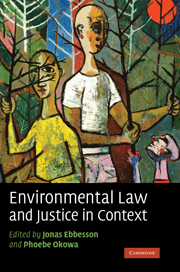Book contents
- Frontmatter
- Contents
- List of contributors
- Preface and acknowledgments
- 1 Introduction: dimensions of justice in environmental law
- Part I The notion of justice in environmental law
- Part II Public participation and access to the judiciary
- Part III State sovereignty and state borders
- Part IV North–South concerns in global contexts
- 15 Competing narratives of justice in North–South environmental relations: the case of ozone layer depletion
- 16 Climate change, global environmental justice and international environmental law
- 17 Justice in global environmental negotiations: the case of desertification
- Part V Access to natural resources
- Part VI Corporate activities and trade
- Index
- References
15 - Competing narratives of justice in North–South environmental relations: the case of ozone layer depletion
from Part IV - North–South concerns in global contexts
Published online by Cambridge University Press: 28 June 2009
- Frontmatter
- Contents
- List of contributors
- Preface and acknowledgments
- 1 Introduction: dimensions of justice in environmental law
- Part I The notion of justice in environmental law
- Part II Public participation and access to the judiciary
- Part III State sovereignty and state borders
- Part IV North–South concerns in global contexts
- 15 Competing narratives of justice in North–South environmental relations: the case of ozone layer depletion
- 16 Climate change, global environmental justice and international environmental law
- 17 Justice in global environmental negotiations: the case of desertification
- Part V Access to natural resources
- Part VI Corporate activities and trade
- Index
- References
Summary
Introduction
We live in a time in which issues of environmental protection and human poverty are near the top of the international agenda. Concerns about justice and injustice are inextricably linked with both. There is often a tendency to separate out the two, so that justice in the environmental context is seen as relating to the proper relationship between humans and the natural world, while justice in the human context is seen as relating to the bonds that unite us to those of our own species within and across borders. Furthermore, these issues are sometimes seen as competing for scarce resources, so that some of those seemingly concerned about Third World poverty view it as an excuse to delay or avoid action on the environmental front. Such views go back to the time of the 1972 Stockholm Conference on the Human Environment. In her statement at the Conference, then Indian Prime Minister Indira Gandhi asserted:
We do not want to impoverish [the] environment any further…[but] we cannot forget the grim poverty of large numbers of people. When they themselves feel deprived how can we urge the preservation of animals? How can we speak to those who live in villages and in slums about keeping the oceans, rivers and the air clean when their own lives are contaminated at the source. Environment cannot be improved in conditions of poverty.
- Type
- Chapter
- Information
- Environmental Law and Justice in Context , pp. 297 - 315Publisher: Cambridge University PressPrint publication year: 2009



